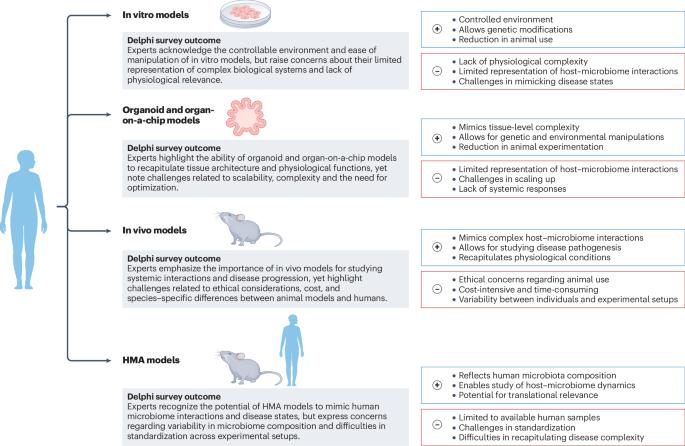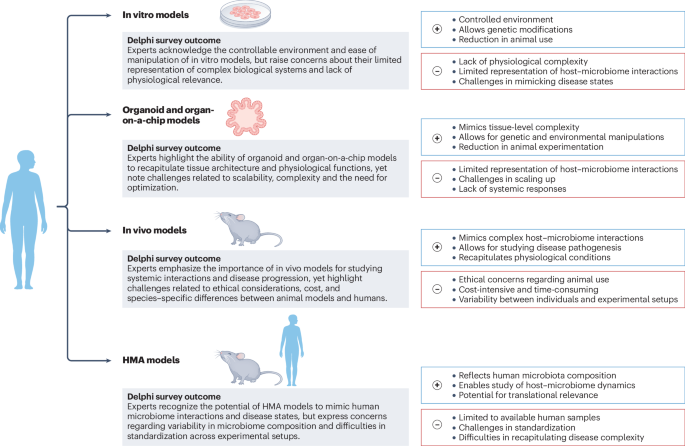关于在微生物组研究中建立因果关系、治疗应用和临床前模型使用的共识声明
IF 51
1区 医学
Q1 GASTROENTEROLOGY & HEPATOLOGY
引用次数: 0
摘要
肠道微生物组由数万亿微生物组成,通过调节新陈代谢、免疫反应和神经元功能对人体健康产生深远影响。肠道微生物群组成的破坏与各种炎症、代谢紊乱和神经退行性疾病有关。然而,确定内在机制和因果关系极为困难。临床前模型为了解肠道微生物组在疾病中的作用提供了重要依据,并有助于确定潜在的治疗干预措施。人类微生物组行动联合会发起了一项德尔菲调查,以评估临床前模型(包括动物和细胞模型)在阐明肠道微生物组在这些疾病中的因果作用方面的实用性。德尔菲调查旨在解决选择合适的临床前模型来调查疾病因果关系和有效研究宿主-微生物组相互作用的复杂性。我们采用了一种结构化方法,包括文献综述、专家研讨会和德尔菲调查问卷,以收集来自不同利益相关者的见解。我们要求专家们评估这些模型在处理肠道微生物组与疾病发病机制之间因果关系方面的优势、局限性和适用性。最终形成的共识声明和建议为今后研究肠道微生物相关疾病时选择临床前模型提供了宝贵的见解。本文章由计算机程序翻译,如有差异,请以英文原文为准。


A Consensus Statement on establishing causality, therapeutic applications and the use of preclinical models in microbiome research
The gut microbiome comprises trillions of microorganisms and profoundly influences human health by modulating metabolism, immune responses and neuronal functions. Disruption in gut microbiome composition is implicated in various inflammatory conditions, metabolic disorders and neurodegenerative diseases. However, determining the underlying mechanisms and establishing cause and effect is extremely difficult. Preclinical models offer crucial insights into the role of the gut microbiome in diseases and help identify potential therapeutic interventions. The Human Microbiome Action Consortium initiated a Delphi survey to assess the utility of preclinical models, including animal and cell-based models, in elucidating the causal role of the gut microbiome in these diseases. The Delphi survey aimed to address the complexity of selecting appropriate preclinical models to investigate disease causality and to study host–microbiome interactions effectively. We adopted a structured approach encompassing a literature review, expert workshops and the Delphi questionnaire to gather insights from a diverse range of stakeholders. Experts were requested to evaluate the strengths, limitations, and suitability of these models in addressing the causal relationship between the gut microbiome and disease pathogenesis. The resulting consensus statements and recommendations provide valuable insights for selecting preclinical models in future studies of gut microbiome-related diseases. In this Consensus Statement, causality, therapeutic applications and preclinical models in microbiome research are critically assessed, highlighting methodological approaches that enhance understanding. Gaps in current knowledge and practice are highlighted, and expert recommendations are given to advance microbiome research and its translation to clinical practice.
求助全文
通过发布文献求助,成功后即可免费获取论文全文。
去求助
来源期刊
CiteScore
52.30
自引率
0.60%
发文量
147
审稿时长
6-12 weeks
期刊介绍:
Nature Reviews Gastroenterology & Hepatology aims to serve as the leading resource for Reviews and commentaries within the scientific and medical communities it caters to. The journal strives to maintain authority, accessibility, and clarity in its published articles, which are complemented by easily understandable figures, tables, and other display items. Dedicated to providing exceptional service to authors, referees, and readers, the editorial team works diligently to maximize the usefulness and impact of each publication.
The journal encompasses a wide range of content types, including Research Highlights, News & Views, Comments, Reviews, Perspectives, and Consensus Statements, all pertinent to gastroenterologists and hepatologists. With its broad scope, Nature Reviews Gastroenterology & Hepatology ensures that its articles reach a diverse audience, aiming for the widest possible dissemination of valuable information.
Nature Reviews Gastroenterology & Hepatology is part of the Nature Reviews portfolio of journals.

 求助内容:
求助内容: 应助结果提醒方式:
应助结果提醒方式:


